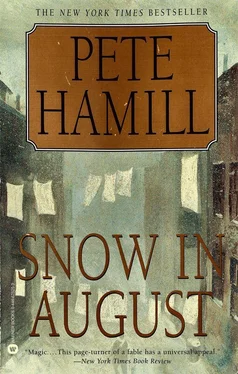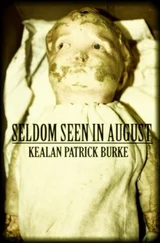Come with me, he seemed to be saying.
Come to the mountains of Bohemia, to their clear streams and green meadows.
Come, sweet Dvorele, and be with me.
But Dvorele had grown up beyond those mountains. And she thought that Joseph Golem wanted to return her to the horror she had escaped. She screamed. She screamed from deep within herself, from her heart and her lungs and her bowels. And she ran from Joseph Golem.
The Golem could not be hurt by knives or spears, but he suddenly erupted in rejection and rage. Michael pictured him toppling the fountain. Then he tore limbs off the beech trees. He smashed the shack where the gardener stored his tools. And in that wreckage, he found an axe.
Armed with an axe, he smashed the back gate of the garden and rushed into the city. In his wordless, heartbroken anger, he chopped at the wheels of carriages and the doors of the rich. He destroyed the carts of the vendors of fish and vegetables. He broke down the doors of the Jewish Town Hall and reduced walls and masonry to powder and rubble. Michael saw people fleeing before him. And to Joseph Golem this became another rejection, more fuel for his blazing, wordless anger.
Michael hid behind a vegetable cart, as one of the councillors hopped on a horse to overtake Rabbi Loew, who was on the road to Pilsen. But Joseph Golem continued his rampage through the ghetto. Doors, windows, fountains, gardens: all were torn up, battered, destroyed. He saw a painting of the mountains and slashed at it with the blade of his axe. It was as if the great creature was looking in the quarter for something he could never find.
Finally, around sundown, Rabbi Loew returned. As he stepped from his carriage, he ignored Michael. His eyes were taking in the wreckage. The rabbi found Joseph Golem sitting in a deserted square, his axe resting on his giant thigh. The creature’s eyes informed the rabbi that he was inconsolable. Rabbi Loew approached slowly, carefully, saying nothing. And for the first time, the Golem reacted in rage and rebellion against the man who had given him life. He threw his head back and released a wordless bellow that could be heard for seven miles. Then he snatched up his axe and began to march on Rabbi Loew. Michael thought: He must see Rabbi Loew as the true cause of his grief. If Rabbi Loew had not raised him from the mud of the Vltava, Joseph Golem would not be suffering the anguish of love.
The Golem stepped forward. He raised his axe. Before Rabbi Loew could give him an order, a small voice rang out sharply in the empty square.
“Stop!”
It was Dvorele.
She walked slowly into the space between the rabbi and the Golem. The great creature lowered the axe.
“Put it down, Joseph,” she said softly.
The creature was wary, suspicious. He glanced at Rabbi Loew and then at the girl. But she was now fearless, as if God had put some iron into her. She came forward and took Joseph Golem’s free hand. The axe fell from the other. She stood then on the tips of her toes, and reached up, and touched his face. The Golem fell awkwardly into a sitting position. Dvorele kissed his cheek. The rage seeped out of him. He seemed to melt.
“Come,” she said to Joseph Golem, turning finally to Rabbi Loew. “Let us go home.”
Holding his hand, she led the Golem back to Rabbi Loew’s house. The rabbi held open the door and the Golem stepped into the vestibule.
“You must sleep,” Dvorele said to him.
The Golem nodded. Rabbi Loew led him upstairs to his own bedroom. He took pillows from the bed, which was too small for Joseph Golem, and laid them on the floor. The Golem was soon asleep.
Rabbi Loew moved quickly. He called for the two assistants who had gone with him that night to the banks of the Vltava. He took the silver spoon from a secret cupboard. He dressed completely in white. He removed the shem from its parchment case. Then he stood at the foot of the Golem, as on the Vltava he had stood at the head. He and his assistants prayed over the sleeping creature. And then Rabbi Loew slipped the shem into the Golem’s mouth and in a grieving voice said the words from the Kabbalah, this time in reverse.
The Golem’s huge body began to twitch. His eyes opened, full of fear and loss.
And then he crumbled into clay.
The assistants separated the clay from the creature’s garments. They shook out the garments and folded them neatly. One assistant brought in two boxes resembling coffins. Rabbi Loew used the silver spoon to pack the clay into one box and tied it shut. The assistants lined the other with thick brocaded cloth, and Rabbi Loew placed the shem and the silver spoon on top. The assistants used nails to seal this coffin.
“Poor creature,” one of the assistants whispered.
Rabbi Loew’s eyes filled with tears.
“Yes,” he said, glancing at the unsealed box. “You must scatter the clay on the banks of the Vltava. We must pray for him, the fine, sweet Golem.”
“Will we ever see him again?” the other assistant asked.
“If we need him,” Rabbi Loew said.
He took the small sealed coffin to the attic of the Old-New Synagogue, to rest among worn and discarded Torah scrolls and holy garments that had rotted with age. Rabbi Loew decreed that nobody could ever again visit the attic, except the chief rabbi. And that rabbi alone would know the secret of the creation of the Golem.
“And so it was,” Rabbi Hirsch said, and entered a long silence. “For centuries.”
Michael cleared his throat.
“And Dvorele?” he said. “What happened to Dvorele?”
Rabbi Hirsch smiled.
“Along comes a handsome boy,” he said. “Also an orphan. He falls in love with Dvorele and marries her, and nine wonderful children they have together.”
Michael Devlin took a deep breath and exhaled hard, knowing that the story was over. Most stories and movies had happy endings, and this was a happy ending.
The rabbi glanced nervously at the door to the sanctuary.
Michael ran through the winter darkness down Kelly Street. His head was full of Prague and the Golem and the spires of distant cathedrals. Men moved through fog. Rats scurried in tunnels. Stones turned into roses. Love caused rage. He wondered who was wandering the streets of Prague at that very moment, and who was in the Old-New Synagogue, and whether the remains of the Golem were safe in their small, ancient coffin. He wondered about the magic words of the Kabbalah and the secret name of God.
And then, as he reached the dark alley that ran behind the Venus movie house, something hit him in the back and he was grabbed and spun and slammed against a wall.
Frankie McCarthy was an inch from his face in the darkness. He was so close that Michael could smell sour beer.
“Hello, Mr. altar boy,” Frankie said. “How’s the little Kike-lover?”
Michael shuddered and said nothing.
“You were wit’ that beard a long time, weren’t you? What’s that all about?”
“I’m helping him learn English,” Michael murmured.
“Oh, you’re a teacher now? I’m freezin’ my ass off waitin’ to talk to you, and you’re a fuckin’ teacher ?”
Frankie lit a cigarette, grinning in the glow of the match. Then he stepped to the side, whirled suddenly, and slapped Michael hard in the face. The boy’s ears rang. His face burned.
“You wouldn’t teach that Yid anything he shouldn’t know, would you, boy? I mean, you wouldn’t, like, teach him about what happened to Mister G, would you?”
“No.”
“But I hear you had some visitors, up your house,” Frankie said. “I hear the bulls came to see you and stood there a long time. You didn’t happen to teach them anything, did you, teacher?”
Читать дальше












